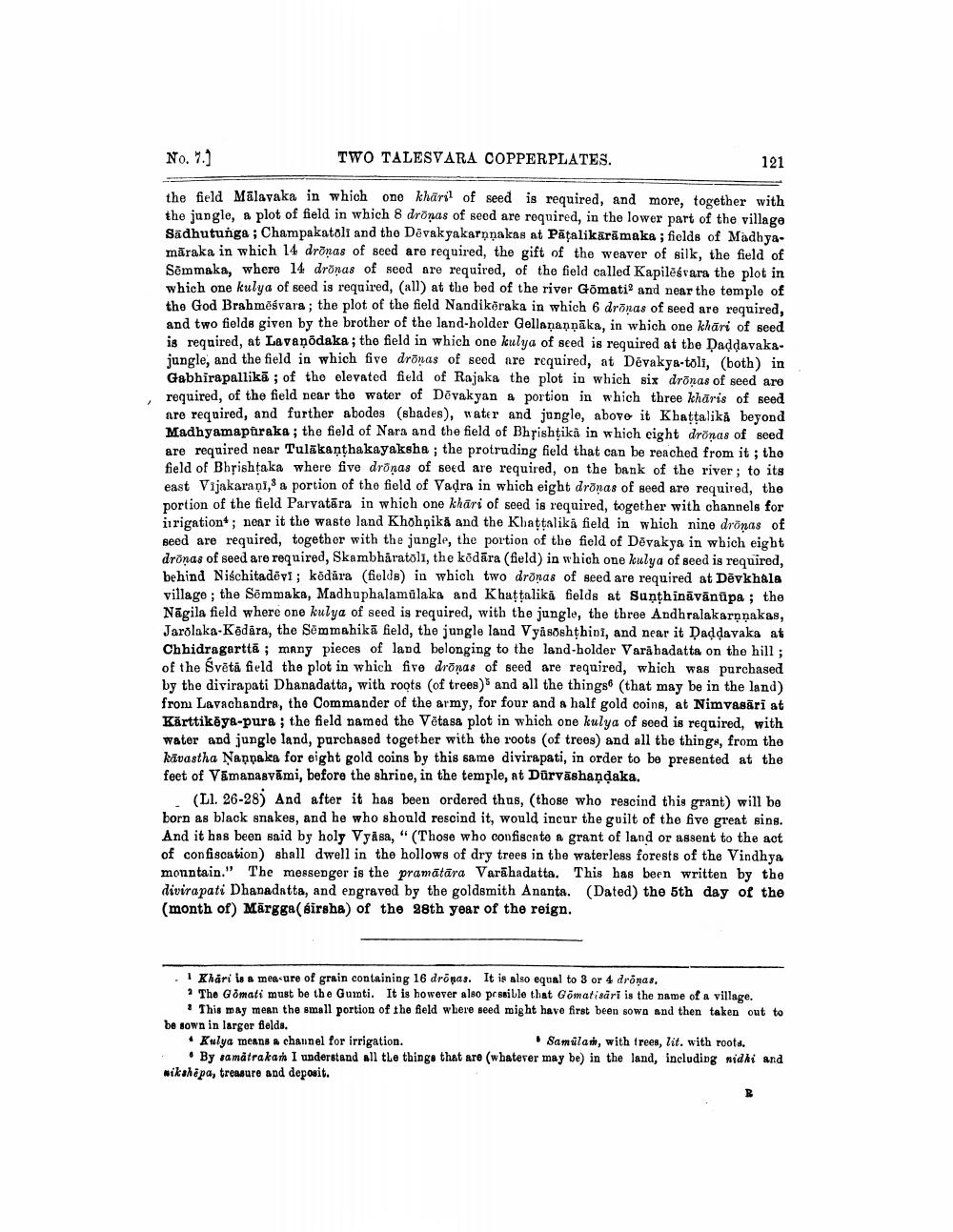________________
No. 7.1
TWO TALESVARA COPPERPLATES.
the field Malavaka in which one kharil of seed is required, and more, together with the jungle, a plot of field in which 8 dronas of seed are required, in the lower part of the village Sadhutunga; Champakatoli and the Devakyakarnnakas at Paṭalikaramaka; fields of Madhyamaraka in which 14 dronas of seed are required, the gift of the weaver of silk, the field of Semmaka, where 14 dronas of seed are required, of the field called Kapilēsvara the plot in which one kulya of seed is required, (all) at the bed of the river Gōmatis and near the temple of the God Brahměsvara; the plot of the field Nandikoraka in which 6 dronas of seed are required, and two fields given by the brother of the land-holder Gellananņāka, in which one khari of seed is required, at Lavanōdaka; the field in which one kulya of seed is required at the Dadḍavaka. jungle, and the field in which five dronas of seed are required, at Dévakya-tōli, (both) in Gabhirapallika; of the elevated field of Rajaka the plot in which six dronas of seed are required, of the field near the water of Devakyan a portion in which three kharis of seed are required, and further abodes (shades), water and jungle, above it Khaṭṭalika beyond Madhyamapuraka; the field of Nara and the field of Bhrishțika in which eight dronas of seed are required near Tulakaṇṭhakayaksha; the protruding field that can be reached from it; the field of Bhrishṭaka where five dronas of seed are required, on the bank of the river; to its east Vijakarani, a portion of the field of Vaḍra in which eight dronas of seed are required, the portion of the field Parvatara in which one khari of seed is required, together with channels for irrigation; near it the waste land Khōhpika and the Khaṭṭalika field in which nine dronas of seed are required, together with the jungle, the portion of the field of Devakya in which eight dronas of seed are required, Skambharatōll, the kodara (field) in which one kulya of seed is required, behind Niśchitadevi; kēdāra (fields) in which two dronas of seed are required at Devkhala village; the Semmaka, Madhuphalamülaka and Khaṭṭalika fields at Sunṭhinavānupa; the Nagila field where one kulya of seed is required, with the jungle, the three Andhralakarnṇakas, Jarolaka-Ködara, the Semmahika field, the jungle land Vyasoshṭhini, and near it Dadḍavaka at Chhidragartta; many pieces of land belonging to the land-holder Varahadatta on the hill; of the Světa field the plot in which five dronas of seed are required, which was purchased by the divirapati Dhanadatta, with roots (of trees) and all the things (that may be in the land) from Lavachandra, the Commander of the army, for four and a half gold coins, at Nimvasari at Kärttikeya-pura; the field named the Vetasa plot in which one kulya of seed is required, with water and jungle land, purchased together with the roots (of trees) and all the things, from the kavastha Nappaka for eight gold coins by this same divirapati, in order to be presented at the feet of Vamanasvami, before the shrine, in the temple, at Durvashaṇḍaka.
121
(Ll. 26-28) And after it has been ordered thus, (those who rescind this grant) will be born as black snakes, and he who should rescind it, would incur the guilt of the five great sins. And it has been said by holy Vyasa, "(Those who confiscate a grant of land or assent to the act of confiscation) shall dwell in the hollows of dry trees in the waterless forests of the Vindhya mountain." The messenger is the pramatāra Varahadatta. This has been written by the divirapati Dhanadatta, and engraved by the goldsmith Ananta. (Dated) the 5th day of the (month of) Margga (sirsha) of the 28th year of the reign.
1 Khari is a measure of grain containing 16 dropas. It is also equal to 3 or 4 dronas.
2 The Gomati must be the Gumti. It is however also possible that Gomatisari is the name of a village.
This may mean the small portion of the field where seed might have first been sown and then taken out to be sown in larger fields.
Kulya means a channel for irrigation.
Samulam, with trees, lit. with roots.
By samatrakam I understand all the things that are (whatever may be) in the land, including nidhi and wikshēpa, treasure and deposit.




